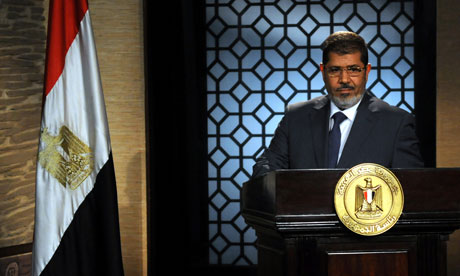
Mohamed Morsi‘s first appointments as president-elect of Egypt will be a woman and a Coptic Christian, his spokesman has told the Guardian, as he moves to allay fears of the Muslim Brotherhood.
Sameh el-Essawy said that although the names of the two choices had not been finalised, they would be Morsi’s two vice-presidents.
When the appointments go through, they will constitute the first time in Egypt’s history that either a woman or a Coptic Christian has occupied such an elevated position in the executive branch.
The Muslim Brotherhood is at pains to calm fears of what an Islamist president might mean for Egypt and the region at large. Appointing both a woman and a Coptic Christian is an attempt at a show of unity, and a rule by consensus.
Meanwhile, defeated presidential candidate Ahmed Shafik – Mubarak’s last prime minister and Morsi’s rival in the runoff election – flew to Abu Dhabi on Tuesday morning with his two daughters. His camp denied that he had fled as investigations begin into allegations of corruption against him while minister of civil aviation. He was in Abu Dhabi for “tourism” purposes, they said.
Essawy also said that Morsi had no objection to swearing the presidential oath in front of the supreme constitutional court (SCC), widely seen as a controversial move after the dissolution of the Muslim Brotherhood-majority parliament by that very court a day before the run-off elections earlier this month. But, “that does not mean he [Morsi] acknowledges the dissolution of parliament”, said Essawy, a member of Morsi’s former party, Freedom and Justice (FJP).
Morsi’s decisions come on a day that saw a flurry of court decisions and delays regarding several contentious issues, including the status of parliament.
The Muslim Brotherhood’s FJP has a 45% majority in the dissolved parliament and is furiously contesting the SCC decision, taking the matter to the supreme administrative court. On Tuesday that court delayed its ruling on the dissolution of parliament until 7 July.
The court also delayed another decision, filed by the former presidential candidate Khaled Ali, against the recent constitutional declaration issued by Scaf, the ruling military junta, which limits presidential authority on a number of matters regarding national security. The court delayed its ruling on this case until 10 July.
The Guardian has the full article









